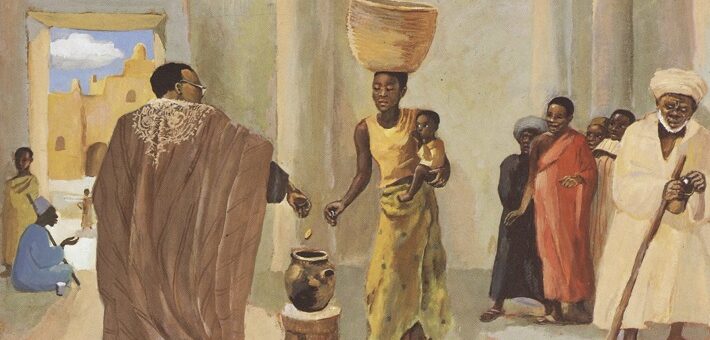Commentary on Ruth 3:1-5; 4:13-17
By the time the reader gets to these passages, she knows that the characters in this story are beyond reproach.
Naomi shares her wisdom with Ruth. Ruth follows Naomi’s sage advice. Naomi blesses Boaz. Boaz blesses Naomi and Ruth. What began with tragedy ends with blessing for the closing verses hint that Ruth, the Moabite, is in the lineage of the beloved King David.
The genius of the book of Ruth begins with its literary simplicity. In chapter one, Naomi’s troubles are relentless as one by one, famine, displacement, and bereavement steal her joy, turning her into a bitter woman. In chapter two Ruth ekes out a living for Naomi and herself. Both are abundantly blessed in the process. In chapter three, Ruth, at Naomi’s bidding, encounters Boaz on the threshing floor. In chapter four, the birth of Ruth’s child Obed brings Naomi joy that she thought would never be hers again. What began in misfortune has turned out to be a blessing for generations to come.
The genius of the book of Ruth is that it is much more than a simple story since there is much complexity in the layers, hints, and innuendo that lies within its pages. First, since its characters are exemplary, the book can be thought of as a morality narrative that demonstrates the blessing of godly living.
Second, knowing that in the world of the bible women’s voices are largely unheard, this story is extraordinary since the voices of Naomi and Ruth are not only heard, their voices move the story forward. They live in a world where women without husbands or other male relatives to care for them are vulnerable. Their story is an example of the resourcefulness of women despite a patriarchal system that intentionally works against them.
Third, it is impossible to overlook the sexual overtones in the book. Just as with the Song of Songs (another biblical book in which a woman speaks and God does not), the church has long been embarrassed by the sexual innuendo concerning Ruth and Boaz on the threshing floor. While the details are left to one’s imagination, it is clear that Ruth intends to entice Boaz with her charms, especially since she goes at night hoping to avoid being seen.
Fourth, although “God is silent … [and] acts indirectly through the people,”1 God’s care is attested. As a poor woman from another country, Ruth’s situation is dire. Though her situation is dire, she is not forgotten. While God is silent, the message is indisputable, “God is on the side of the marginalized.”2 Not that God is unconcerned about people who live on the center, but God’s care for Naomi and Ruth are indications that God cares even when the world is indifferent. The implication is that “Yahweh … [is] God of the whole world.”3
Fifth, the book of Ruth is a story about “the birth of the monarchy”4 and a fulfillment of God’s promise to Abraham that would eventually be a blessing to all humanity. In a nation where bloodline was important, the book may have served to validate the Davidic line which included “foreign ancestry”5 and/or “function as an apology for non-Israelites as a whole.”6 The subtle message is not so subtle, for “even Israel’s greatest king is descended from a poor, vulnerable woman from a despised foreign nation.”7 Ruth’s inclusion in Jesus’ lineage enlarges the message even further. If God is the God of all humanity, why would not all humanity have a role in the lineage of the Incarnate Jesus?
Last, the book of Ruth is a reminder that it is important to honor the humanity of every person. There is no need for anyone to think too highly or too lowly of others or themselves. In a world where connections to one’s own family group could determine matters of life or death, Ruth and Naomi’s willingness to cross boundaries to create friendship is remarkable. These two women are about as different as two people can be. There are differences in “age, nationality, and religion.”8 Theirs is a story about what happens when two people from different social locations decide that relationship is more important than cultural definitions of what relationships should be or any experiences that might have kept them apart.
Through her friendship with Naomi, Ruth becomes the great-grandmother of King David. Through her friendship with Ruth, Naomi again experiences a joy untold. In a world, ancient or contemporary, where people are unwilling to extend themselves on behalf of others and be changed for the better by the encounter, this story stands as an indictment of closed hearts, minds, and spirits of any age.
Notes:
1 Kristen Nielsen, “Other Writings (Ruth, Song of Songs, Esther, Daniel)” in The Hebrew Bible Today: An Introduction to Critical Issues,” eds. Steven L. McKenzie and M. Patrick Graham (Louisville: Westminster John Knox Press, 1998), 178.
5 Eric M. Meyers and John Rogerson, “Part One. The World of the Hebrew Bible,” in The Cambridge Companion to the Bible, 2nd ed., ed. Bruce Chilton et al (Cambridge: Cambridge University Press, 2008), 301.
6 Ibid.
7 Wilda C. Gafney, “Ruth,” in The Peoples’ Companion to the Bible, ed. Curtiss Paul DeYoung et al (Minneapolis: Fortress Press, 2010), 128.
8 Renita Weems, Just a Sister Away: A Womanist Vision of Women’s Relationship in the Bible (Philadelphia: Innisfree Press, Inc., 1988), 25.


November 8, 2015